- Home
- Octavia E. Butler
Bloodchild and Other Stories Page 13
Bloodchild and Other Stories Read online
Page 13
Thera was relentless. “But do you forgive them for what they’ve done?”
Noah shook her head. “I don’t forgive them,” she said. “They haven’t asked for my forgiveness and I wouldn’t know how to give it if they did. And that doesn’t matter. It doesn’t stop me from doing my job. It doesn’t stop them from employing me.”
James Adio said, “If they’re as dangerous as you believe, you ought to be working with the government, trying to find a way to kill them. Like you said, you know more about them than the rest of us.”
“Are you here to kill them, Mr. Adio?” Noah asked quietly.
He let his shoulders slump. “I’m here to work for them, lady. I’m poor. I don’t have all kinds of special knowledge that only thirty people in the whole country have. I just need a job.”
She nodded as though he had simply been conveying information, as though his words had not carried heavy loads of bitterness, anger, and humiliation. “You can make money here.” She said. “I’m wealthy myself. I’m putting half a dozen nieces and nephews through college. My relatives eat three meals a day and live in comfortable homes. Why shouldn’t yours?”
“Thirty pieces of silver,” he muttered.
Noah gave him a tired smile. “Not for me,” she said. “My parents seemed to have a completely different role in mind for me when they named me.”
Rune Johnsen smiled but James Adio only stared at her with open dislike. Noah let her face settle into its more familiar solemnity. “Let me tell you all about my experience working with the government to get the better of the Communities,” she said. “You should hear about it whether or not you choose to believe.” She paused, gathered her thoughts.
• • •
“I was held here in the Mojave Bubble from my eleventh year through my twenty-third,” she began. “Of course, none of my family or friends knew where I was or whether I was alive. I just disappeared like a lot of other people. In my case, I disappeared from my own bedroom in my parents’ house in Victorville late one night. Years later when the Communities could talk to us, when they understood more of what they’d done to us, they asked a group of us whether we would stay with them voluntarily or whether we wanted to leave. I thought it might have been just another of their tests, but when I asked to go, they agreed.
“In fact, I was the first to ask to go. The group I was with then was made up of people taken in childhood—sometimes early childhood. Some of them were afraid to go out. They had no memory of any home but the Mojave Bubble. But I remembered my family. I wanted to see them again. I wanted to go out and not be confined to a small area in a bubble. I wanted to be free.
“But when the Communities let me go, they didn’t take me back to Victorville. They just opened the bubble late one night near one of the shanty towns that had grown up around its perimeters. The shanty towns were wilder and cruder back then. They were made up of people who were worshipping the Communities or plotting to wipe them out or hoping to steal some fragment of valuable technology from them—that kind of thing. And some of the squatters there were undercover cops of one kind or another. The ones who grabbed me said they were FBI, but I think now that they might have been bounty hunters. In those days, there was a bounty on anyone or anything that came out of the bubbles, and it was my bad luck to be the first person to be seen coming out of the Mojave Bubble.
“Anyone coming out might know valuable technological secrets, or might be hypnotized saboteurs or disguised alien spies—any damned thing. I was handed over to the military which locked me up, questioned me relentlessly, accused me of everything from espionage to murder, from terrorism to treason. I was sampled and tested in every way they could think of. They convinced themselves that I was a valuable catch, that I had been collaborating with our “nonhuman enemies.” Therefore, I represented a great opportunity to find a way to get at them—at the Communities.
“Everything I knew, they found out. It wasn’t as though I was ever trying to hold anything back from them. The problem was, I couldn’t tell them the kind of thing they wanted to know. Of course the Communities hadn’t explained to me the workings of their technology. Why would they? I didn’t know much about their physiology either, but I told what I did know—told it over and over again with my jailers trying to catch me in lies. And as for the Communities’ psychology, I could only say what had been done to me and what I’d seen done to others. And because my jailers didn’t see that as very useful, they decided I was being uncooperative, and that I had something to hide.”
Noah shook her head. “The only difference between the way they treated me and the way the aliens treated me during the early years of my captivity was that the so-called human beings knew when they were hurting me. They questioned me day and night, threatened me, drugged me, all in an effort to get me to give them information I didn’t have. They’d keep me awake for days on end, keep me awake until I couldn’t think, couldn’t tell what was real and what wasn’t. They couldn’t get at the aliens, but they had me. When they weren’t questioning me, they kept me locked up, alone, isolated from everyone but them.”
Noah looked around the room. “All this because they knew—knew absolutely—that a captive who survived twelve years of captivity and who is then freed must be a traitor of some kind, willing or unwilling, knowing or unknowing. They x-rayed me, scanned me in every possible way, and when they found nothing unusual, it only made them angrier, made them hate me more. I was, somehow, making fools of them. They knew it! And I wasn’t going to get away with it.
“I gave up. I decided that they were never going to stop, that they would eventually kill me anyway, and until they did, I would never know any peace.”
She paused remembering humiliation, fear, hopelessness, exhaustion, bitterness, sickness, pain.… They had never beaten her badly—just struck a few blows now and then for emphasis and intimidation. And sometimes she was grabbed, shaken, and shoved, amid ongoing accusations, speculations, and threats. Now and then, an interrogator, knocked her to the floor, then ordered her back to her chair. They did nothing that they thought might seriously injure or kill her. But it went on and on and on. Sometimes one of them pretended to be nice to her, courted her in a sense, tried to seduce her into telling secrets she did not know.…
“I gave up,” she repeated. “I don’t know how long I’d been there when that happened. I never saw the sky or sunlight so I lost all track of time. I just regained consciousness after a long session, found that I was in my cell alone, and decided to kill myself. I had been thinking about it off and on when I could think, and suddenly, I knew I would do it. Nothing else would make them stop. So I did do it. I hanged myself.”
Piedad Ruiz made a wordless sound of distress, then stared downward at the table when people looked at her.
“You tried to kill yourself?” Rune Johnsen asked. “Did you do that when you were with the … the Communities?”
Noah shook her head. “I never did.” She paused. “It mattered more than I know how to tell you that this time my tormentors were my own people. They were human. They spoke my language. They knew all that I knew about pain and humiliation and fear and despair. They knew what they were doing to me, and yet it never occurred to them not to do it.” She thought for a moment, remembering. “Some captives of the Communities did kill themselves. And the Communities didn’t care. If you wanted to die and managed to hurt yourself badly enough, you’d die. They’d watch.”
But if you didn’t choose to die, there was the perverse security and peace of being enfolded. There was, somehow, the pleasure of being enfolded. It happened often when captives were not being tested in some way. It happened because the entities of the Communities discovered that it pleased and comforted them too, and they didn’t understand why any more than she did. The first enfoldings happened because they were convenient ways of restraining, examining, and, unhappily, poisoning human captives. It wasn’t long, though, before unoccupied humans were being enfolded just for the pleasure t
he act gave to an unoccupied Community. Communities did not understand at first that their captives could also take pleasure in the act. Human children like Noah learned quickly how to approach a Community and touch its outer branches to ask to be enfolded, although adult human captives had tried to prevent the practice, and to punish it when they could not prevent it. Noah had had to grow up to even begin to understand why adult captives sometimes beat children for daring to ask alien captors for comfort.
Noah had met her current employer before she turned twelve. It was one of the Communities who never injured her, one who had worked with her and with others to begin to assemble a language that both species could use.
She sighed and continued her narrative. “My human jailers were like the Communities in their attitude toward suicide,” she said. “They watched too as I tried to kill myself. I found out later that there were at least three cameras on me day and night. A lab rat had more privacy than I did. They watched me make a noose of my clothing. They watched me climb onto my bed and tie off the noose to a grill that protected the speaker they sometimes used to blast me with loud, distorted music or with old news broadcasts from when the aliens first arrived and people were dying in the panic.
“They even watched me step off my bed and dangle by my neck, strangling. Then they got me out of there, revived me, made sure I wasn’t seriously injured. That done, they put me back in my cell, naked and with the speaker recess concreted over and the grill gone. At least, after that there was no more horrible music. No more terrified screaming.
“But the questioning began again. They even said I hadn’t really meant to kill myself, that I was just making a bid for sympathy.
“So I left in mind, if not in body. I sort of went catatonic for a while. I wasn’t entirely unconscious, but I wasn’t functioning any more. I couldn’t. They knocked me around at first because they thought I was faking. I know they did that because later I had some unexplained and untreated broken bones and other medical problems to deal with.
“Then someone leaked my story. I don’t know who. Maybe one of my interrogators finally grew a conscience. Anyway, someone started telling the media about me and showing them pictures. The fact that I was only eleven when I was taken turned out to be important to the story. At that point, my captors decided to give me up. I suppose they could have killed me just as easily. Considering what they had been doing to me, I have no idea why they didn’t kill me. I’ve seen the pictures that got published. I was in bad shape. Maybe they thought I’d die—or at least that I’d never wake all the way up and be normal again. And, too, once my relatives learned that I was alive, they got lawyers and fought to get me out of there.
“My parents were dead—had died in a car wreck while I was still a captive in the Mojave Bubble. My jailers must have known, but they never said a word. I didn’t find out until I began to recover and one of my uncles told me. My uncles were my mother’s three older brothers. They were the ones who fought for me. To get me, they had to sign away any rights they may have had to sue. They were told that the Communities were the ones who had injured me. They believed it until I revived enough to tell them what really happened.
“After I told them, they wanted to tell the world, maybe put a few people in prison where they belonged. If they hadn’t had families of their own, I might not have been able to talk them out of it. They were good men. My mother was their baby sister, and they’d always loved her and looked after her. As things were, though, they had had to go into serious debt to get me free, repaired and functional again. I couldn’t have lived with the thought that because of me, they lost everything they owned, and maybe even got sent to prison on some fake charge.
“When I’d recovered a little, I had to do some media interviews. I told lies, of course, but I couldn’t go along with the big lie. I refused to confirm that the Communities had injured me. I pretended not to remember what had happened. I said I had been in such bad shape that I didn’t have any idea what was going on most of the time, and that I was just grateful to be free and healing. I hoped that was enough to keep my human ex-captors content. It seemed to be.
“The reporters wanted to know what I was going to do, now that I was free.
“I told them I would go to school as soon as I could. I would get an education, then a job so that I could begin to pay my uncles back for all they had done for me.
“That’s pretty much what I did. And while I was in school, I realized what work I was best fitted to do. So here I am. I was not only the first to leave the Mojave Bubble, but the first to come back to offer to work for the Communities. I had a small part in helping them connect with some of the lawyers and politicians I mentioned earlier.”
“Did you tell your story to the weeds when you came back here?” Thera Collier asked suspiciously. “Prison and torture and everything?”
Noah nodded. “I did. Some Communities asked and I told them. Most didn’t ask. They have problems enough among themselves. What humans do to other humans outside their bubbles is usually not that important to them.”
“Do they trust you?” Thera asked. “Do the weeds trust you?”
Noah smiled unhappily. “At least as much as you do, Ms. Collier.”
Thera gave a short bark of laughter, and Noah realized the woman had not understood. She thought Noah was only being sarcastic.
“I mean they trust me to do my job,” Noah said. “They trust me to help would-be employers learn to live with a human being without hurting the human and to help human employees learn to live with the Communities and fulfill their responsibilities. You trust me to do that too. That’s why you’re here.” That was all true enough, but there were also some Communities—her employer and a few others—who did seem to trust her. And she trusted them. She had never dared to tell anyone that she thought of these as friends.
Even without that admission, Thera gave her a look that seemed to be made up of equal parts pity and contempt.
“Why did the aliens take you back,” James Adio demanded. “You could have been bringing in a gun or a bomb or something. You could have been coming back to get even with them for what they’d done to you.”
Noah shook her head. “They would have detected any weapon I could bring in. They let me come back because they knew me and they knew I could be useful to them. I knew I could be useful to us, too. They want more of us. Maybe they even need more of us. Better for everyone if they hire us and pay us instead of snatching us. They can take mineral ores from deeper in the ground than we can reach, and refine them. They’ve agreed to restrictions on what they take and where they take it. They pay a handsome percentage of their profit to the government in fees and taxes. With all that, they still have plenty of money to hire us.”
She changed the subject suddenly. “Once you’re in the bubble, learn the language. Make it clear to your employers that you want to learn. Have you all mastered the basic signs?” She looked them over, not liking the silence. Finally she asked, “Has anyone mastered the basic signs?”
Rune Johnsen and Michelle Ota both said, “I have.”
Sorrel Trent said, “I learned some of it, but it’s hard to remember.”
The others said nothing. James Adio began to look defensive. “They come to our world and we have to learn their language,” he muttered.
“I’m sure they would learn ours if they could, Mr. Adio,” Noah said wearily. “In fact, here at Mojave, they can read English, and even write it—with difficulty. But since they can’t hear at all, they never developed a spoken language of any kind. They can only converse with us in the gesture and touch language that some of us and some of them have developed. It takes some getting used to since they have no limbs in common with us. That’s why you need to learn it from them, see for yourself how they move and feel the touch-signs on your skin when you’re enfolded. But once you learn it, you’ll see that it works well for both species.”
“They could use computers to speak for them,” Thera Collier said. “
If their technology isn’t up to it, they could buy some of ours.”
Noah did not bother to look at her. “Most of you won’t be required to learn more than the basic signs,” she said. “If you have some urgent need that the basics don’t cover, you can write notes. Print in block capital letters. That will usually work. But if you want to move up a paygrade or two and be given work that might actually interest you, learn the language.”
“How do you learn,” Michelle Ota asked. “Are there classes?”
“No classes. Your employers will teach you if they want you to know—or if you ask. Language lessons are the one thing you can ask for that you can be sure of getting. They’re also one of the few things that will get your pay reduced if you’re told to learn and you don’t. That will be in the contract. They won’t care whether you won’t or you can’t. Either way it’s going to cost you.”
“Not fair,” Piedad said.
Noah shrugged. “It’s easier if you have something to do anyway, and easier if you can talk with your employer. You can’t bring in radios, televisions, computers, or recordings of any kind. You can bring in a few books—the paper kind—but that’s all. Your employers can and will call you at any time, sometimes several times in a day. Your employer might lend you to … relatives who haven’t hired one of us yet. They might also ignore you for days at a time, and most of you won’t be within shouting distance of another human being.” Noah paused, stared down at the table. “For the sake of your sanity, go in with projects that will occupy your minds.”
Rune said, “I would like to hear your description of our duties. What I read sounded almost impossibly simple.”

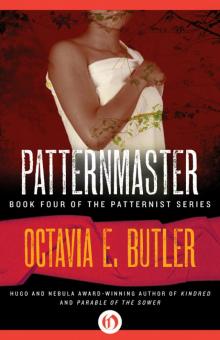 Patternmaster
Patternmaster Survivor
Survivor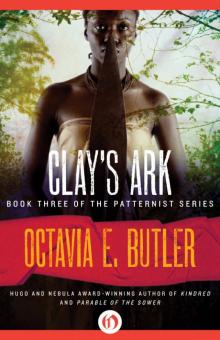 Clay's Ark
Clay's Ark Bloodchild and Other Stories
Bloodchild and Other Stories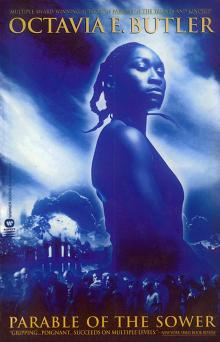 Parable of the Sower
Parable of the Sower Wild Seed
Wild Seed Fledgling
Fledgling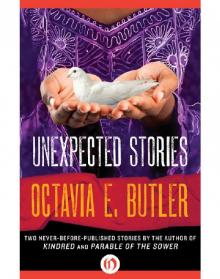 Unexpected Stories
Unexpected Stories Kindred
Kindred Lilith's Brood: Dawn / Adulthood Rites / Imago
Lilith's Brood: Dawn / Adulthood Rites / Imago Adulthood Rites
Adulthood Rites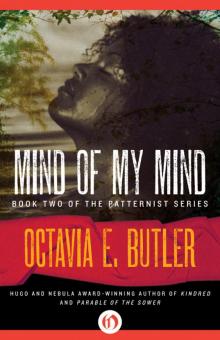 Mind of My Mind
Mind of My Mind Seed to Harvest
Seed to Harvest Lilith's Brood: Dawn, Adulthood Rites, and Imago (Xenogenesis Trilogy)
Lilith's Brood: Dawn, Adulthood Rites, and Imago (Xenogenesis Trilogy)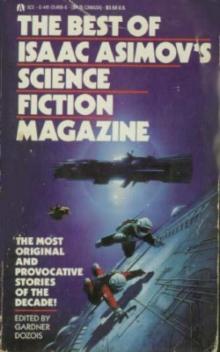 Bloodchild
Bloodchild Seed to Harvest: Wild Seed, Mind of My Mind, Clay's Ark, and Patternmaster (Patternist)
Seed to Harvest: Wild Seed, Mind of My Mind, Clay's Ark, and Patternmaster (Patternist)